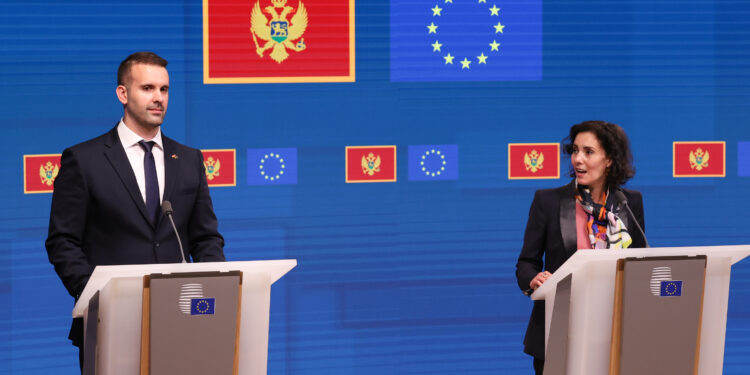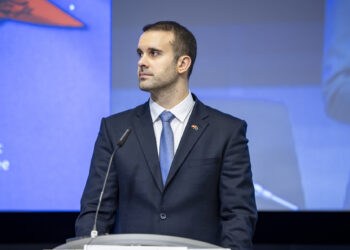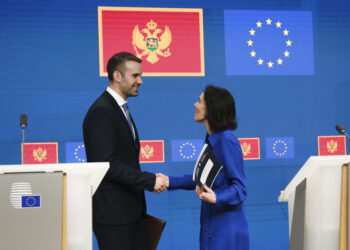Brussels – By now, it has become a mantra between Podgorica and Brussels, but it certainly shows the dedication Montenegro has committed itself to the EU accession process. “If we meet all the benchmarks, we expect to become the 28th member country by 2028,” began Montenegrin Prime Minister Milojko Spajić before the start of the 16th intergovernmental conference this afternoon (June 26) – the second organized by the Belgian rotating presidency of the EU Council – which marked a decisive step on the path to EU membership.
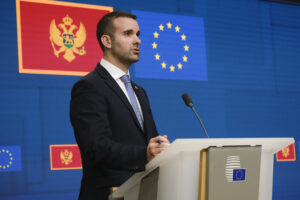
A “historic” conference, as it was called by the European Commissioner for Enlargement and Neighborhood Policy, Olivér Várhelyi, who emphasized that “we have finally seen Montenegro move forward on the road to accession” since Podgorica has overall met the intermediate benchmarks set for chapters 23 (judiciary and fundamental rights) and 24 (justice, freedom, and security): “Now we open the last stage of accession negotiations, it means that accession is imminent,” Commissioner Várhelyi said, adding that “now we have to start closing these chapters. From our side, we will do everything we can to do it in the coming months.” The first Accession Conference meeting with Montenegro at the ministerial level was in June 2012. Since then, 33 negotiating chapters (out of 35) have been opened, with three provisionally closed. In May 2021, the Council approved the application of the revised enlargement methodology to accession negotiations with Montenegro and Serbia, aiming to reinvigorate the accession process.
Reiterating what he said in an exclusive interview with Eunews in February, Prime Minister Spajić made clear that “it is a great day for the European Union as well because we are the first country that with the new methodology was tested. In a way, we are breaking the ice for the other Western Balkan countries and other candidates for accession.” There is tremendous enthusiasm in Podgorica, both for the “historic moment” that today’s result represents and for the work that will now strengthen in the coming months to close other negotiating chapters. “In the last seven years, we have accelerated the process and achieved results as in the previous seven years. We are really proud,” the Montenegrin leader pointed out at a private event in Brussels with Montenegrin diplomatic staff, which Eunews had access to. As confirmed by Belgian Foreign Minister and rotating chair of the EU Council, Hadja Lahbib, “The path to EU membership is long and arduous, but this is a message of hope that Montenegro sends to the entire Balkan region and beyond.” Now, the baton passes to Hungary starting Monday (July 1). However, several diplomatic sources – Montenegrin and non-Montenegrin – assure that “there is no concern” that negotiations will continue over the next six months.
The new stability in Montenegro
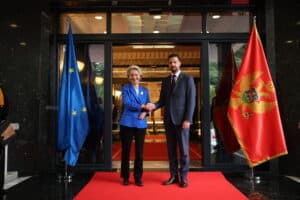
2023 marked the end of a crisis in Montenegro — both institutional and political — that lasted over three years. Since February last year, there has been a succession of triumphs for the new pro-European movement Europe Now, founded and led by those who are now the Prime Minister and President of Montenegro – Spajić and Jakov Milatović (who, however, exited the party in February 2024), respectively – winners from the double round of elections in just over two months: the presidential runoff on April 2 and the elections for the renewal of Parliament on June 11.
PM Spajić – elected on the day of the visit to Podgorica of EU Commission President Ursula von der Leyen – and President Milatović were, respectively, Minister of Finance and Economy and Economic Development in the grand anti-Đukanović coalition (father-master of the Balkan country for 32 years) that Krivokapić led from December 4, 2020-April 28, 2022. During their year and a half in government, the two presented a program of economic reforms called Europe Now, which included measures such as cutting healthcare contributions and raising the minimum wage to 450 euros. The two technocrats announced their willingness to found a new liberal, anti-corruption, and pro-European center-right party after the fall of the Krivokapić government in February 2022. They established the new party on June 26 – anticipating their intention to work with other civic and center formations ahead of the 2023 elections.
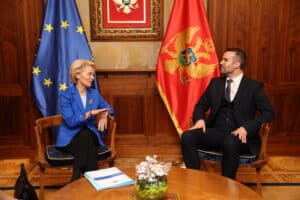
The appointment of Spajić and Milatović (the youngest ever elected to the country’s two institutional posts, both aged 36) ended a turbulent phase for Montenegro that began with the August 30, 2020 elections. On that occasion, the political balance changed after 30 uninterrupted years in power for Đukanović’s DPS (always ruling or presiding over the country since 1991). Leading the executive for a little over a year was a coalition formed by the pro-Serbs of ‘For the Future of Montenegro’ (of then PM Zdravko Krivokapić), the moderates of ‘Peace is Our Nation’ (led by Democratic Montenegro), and the ‘Black on White’ civic platform dominated by the Civic Movement United Reformist Action (URA) of Dritan Abazović. On February 4, 2022, Black on White challenged the Krivokapić government, endorsing a motion from the opposition and initiating the Abazović minority government.
However, Abazović’s government collapsed on August 19 (the shortest in the country’s history) with the motion of no-confidence from Đukanović’s new DPS allies due to the so-called ‘fundamental agreement’ with the Serbian Orthodox Church. The understanding to regulate mutual relations – with the recognition of the presence and continuity of the Serbian Orthodox Church in Montenegro since 1219 – was supported by pro-Serbian parties, while all others rejected it because it was considered Belgrade’s interference in the country and an obstacle on the road to EU membership. Amid the institutional crisis that emerged since the second half of the year and after he refused to appoint a new prime minister, on March 16, former President Đukanović disbanded Parliament and called new early elections for June 11, not knowing that within a few weeks, he would lose first the Presidential elections and then the national elections.
Find more insights on the Balkan region in the BarBalkan newsletter hosted by Eunews
English version by the Translation Service of Withub